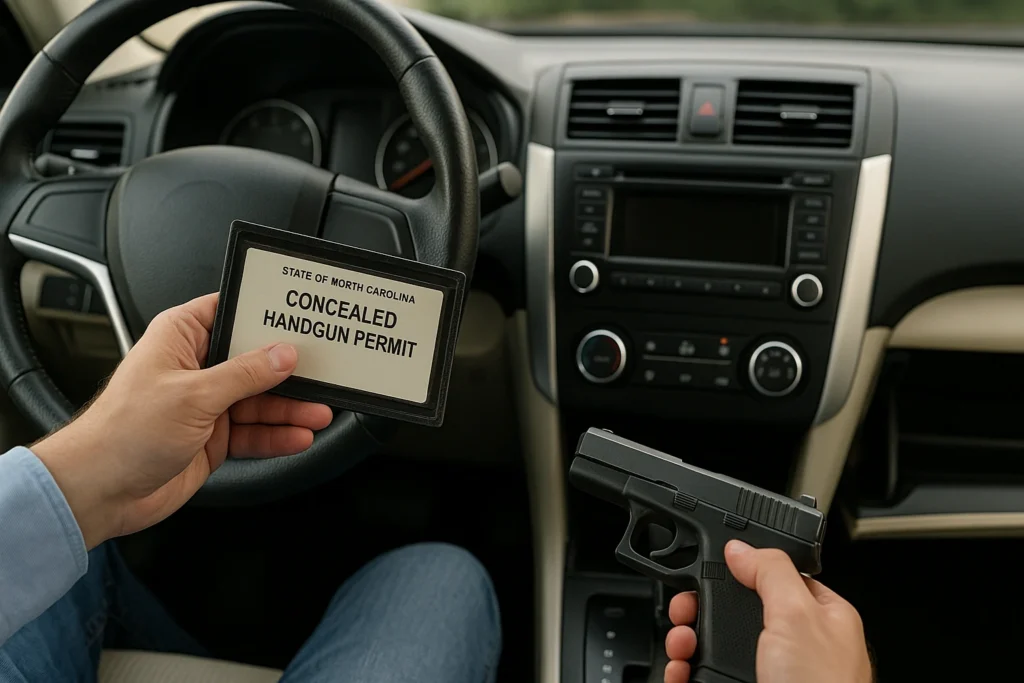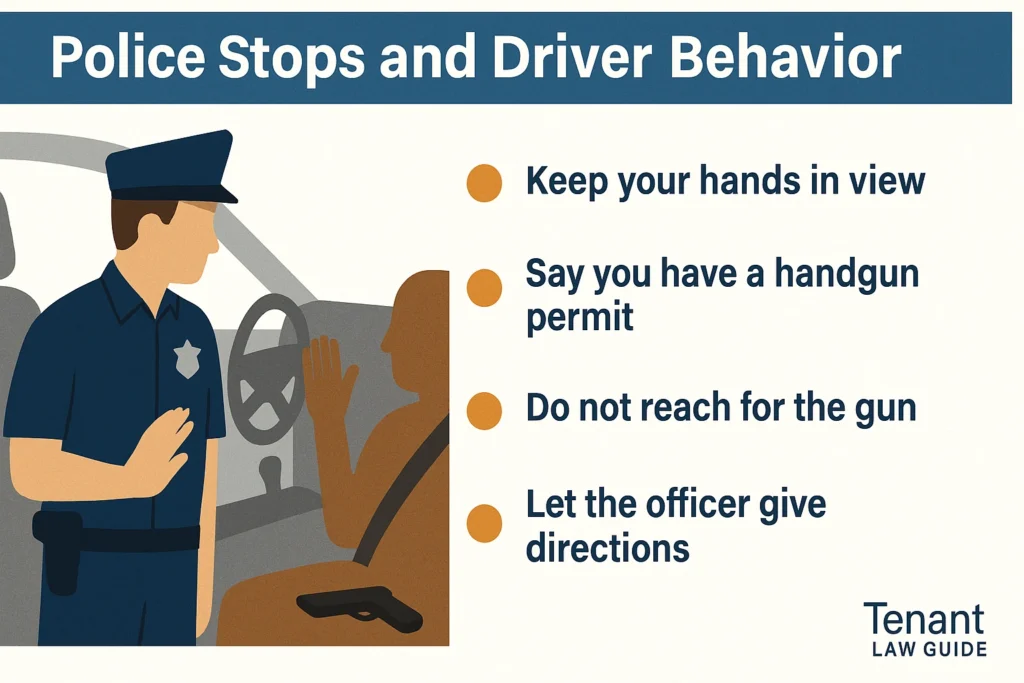Gun laws in the United States can shift from one state to another. A legal act in one state may become a crime in the next. Drivers must pay close attention. North Carolina holds firm rules when it comes to carrying guns in vehicles.
These rules apply to both residents and visitors. Many people do not realize how fast they can break the law just by how they place a gun inside a car.
Carrying a firearm inside a vehicle is not the same as carrying it on foot. The law treats cars as different spaces. A gun may sit in the open on your belt in public.
That same gun may cause charges if you place it under your seat. The change in setting turns a legal right into a legal risk.
That shift matters in North Carolina more than in many other places. Every driver must know the rules before they get on the road. A firearm inside your car can protect you.
Open Carry in Cars Without a Permit
North Carolina allows open carry in most public spaces. This rule covers walking down the street or standing in a park. It also covers cars but only under one strict condition.
The firearm must remain in plain sight. If the gun goes under a jacket or inside a glove box, it becomes a problem.
Drivers without a concealed handgun permit may carry a gun in a car. The law allows it only if the weapon stays visible. A gun on the passenger seat is legal.
A gun under the seat is not. Once the weapon goes out of sight, the state treats it as concealed. That leads to criminal charges.
Officers can stop a driver who tries to hide a weapon. They will ask questions. They will expect clear answers.
Even if you feel safe storing the gun out of view, that choice can cost you. North Carolina law draws a firm line. Visibility means legality. Concealment means risk.
Carrying in a Car With a Concealed Handgun Permit
A concealed handgun permit changes the rules. It gives the driver more freedom. Permit holders can place a firearm in a glove box, under the seat, or inside a locked case. The law allows these choices, but only when the driver has a valid permit.
You must carry the permit when you carry the gun. You must tell any officer that you have both. During a stop, keep your hands in sight. Speak in a calm voice.

State clearly that you have a firearm and a permit. Do not reach for the gun unless the officer gives direct instructions. Even with a permit, some locations remain off-limits. Government buildings, schools, and posted private property often ban all firearms.
This includes guns stored in cars. The permit does not override these zones. Driving into the wrong area can turn a lawful carry into a legal crisis.
Safe Gun Storage in Vehicles
Smart gun owners know storage matters. A safe gun is a stored gun. Whether you have a permit or not, the way you place the firearm inside the car can protect or harm you. Police also check for this during stops. They look at how and where the gun rests.
If you have no permit, you must keep the gun where it can be seen. You should not cover it with papers or clothing. A loaded gun on the floor or under a towel counts as concealed. Even a mistake like that can lead to arrest. Clear display is not just smart, it is required.
If you have a permit, you still need to use caution. A loose gun under the seat may slide or shift during a drive. That makes it harder to access and more likely to cause harm. Use a locked case. Use a mounted holder. Choose methods that keep the weapon stable and safe. These habits show respect for the law and for life.
Restricted Areas You Must Avoid
North Carolina law blocks guns in specific places. These areas carry extra rules. Some of them may apply even if you never leave your vehicle. Parking lots and driveways linked to certain zones may fall under gun bans.
You cannot carry a gun onto school property. That includes the car line, the parking lot, and all driveways tied to the school. Even if you stay inside your car, the law still applies. You must secure the gun in a locked container. You may also choose to remove it from the vehicle before you enter the area.
Courthouses, jails, and federal buildings also block all firearms. That rule includes any gun inside a car. Many private businesses post signs that ban guns as well. These signs carry weight under state law. If you enter their property with a gun, you may face charges.
Always read the signs. Always check your surroundings. Do not assume that a permit protects you everywhere. North Carolina makes it clear. Certain places will not allow any guns, in any form, in any vehicle.
Police Stops and Driver Behavior
Traffic stops test your knowledge and your nerves. When you carry a gun in your car, the stop can turn tense. Your actions in those moments matter. They can shape the outcome of the encounter and your legal future.
If you do not have a permit, make sure the gun is in plain view before the officer walks up. Speak clearly. Answer all questions with respect. Stay calm.

If you have a permit, say so as soon as the officer speaks to you. Do not reach for the gun. Do not make fast moves. Say that you have a firearm and a valid permit. Then wait. Let the officer decide the next steps.
Police officers in North Carolina train for these situations. They respect drivers who follow the rules. They expect clear answers and calm actions. If you panic or hide the truth, the risk grows. Be honest. Be still. And be smart.
Breaking the Law: What Can Happen
Gun violations in North Carolina bring real penalties. The courts do not treat these cases lightly. A single mistake can lead to jail, loss of rights, or both. Even first-time offenders face strict outcomes.
If you carry a concealed gun without a permit, the state may charge you with a misdemeanor. That charge may bring jail time, a fine, or both. If the gun shows up in a restricted zone, the charge may rise. Some of these offenses count as felonies. A felony record can stop you from owning guns for life.
Failing to tell an officer about a concealed gun may also lead to trouble. The permit may be suspended. You may lose the right to renew it later. These penalties add up. They affect more than your record. They can hurt your job, your family, and your name.
The only safe path is to learn the law and follow it. Guesswork and shortcuts never help. Know your rights. Know your duties. Then follow them every time.
Why This Matters to All U.S. Drivers
Gun laws vary from state to state. Some allow more freedom. Others place tighter limits. North Carolina stands near the middle. It allows carrying, but only under clear rules. That balance makes the state strict but fair.
Drivers who cross state lines must respect these laws. What works in Texas or Arizona may not work here. U.S. gun owners often travel with weapons. That travel carries risk. Without the right knowledge, a legal gun becomes a legal threat.
If you live in North Carolina or visit often, make time to learn the law. Study it before the trip. Review it before a stop. Help others stay informed. When everyone knows the rules, fewer lives get ruined.
Conclusion
Carrying a gun in a vehicle means more than placing it in a seat or case. It means knowing the law and honoring it at all times. In North Carolina, you must understand where your rights begin and where they end.
Follow the rules. Store the gun right. Speak with care. That is the best way to stay safe, legal, and in control on every road. One wrong move can lead to lifelong consequences, but the right steps keep you protected and prepared.
Drivers across the United States should treat North Carolina’s laws as a model of smart firearm handling. Each rule has a purpose. Each step you take in compliance shows maturity, caution, and control.
Guns are tools, not toys. In the wrong hands or wrong place, they create damage. In the right hands and under the law, they offer safety. Learn the law, respect the process, and drive with purpose.
Disclaimer:
This article is for general informational purposes only. It does not provide legal advice. Consult a licensed attorney or your local law enforcement agency for specific legal guidance.



